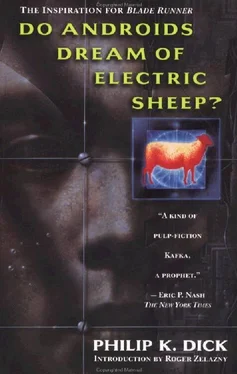John Isidore, being yammered at by the television set in his living room as he shaved in the bathroom, was one of these.
He simply had wandered to this spot in the early days following the war. In those evil times no one had known, really, what they were doing. Populations, detached by the war, had roamed, squatted temporarily at first one region and then another. Back then the fallout had been sporadic and highly variable; some states had been nearly free of it, others became saturated. The displaced populations moved as the dust moved. The peninsula south of San Francisco had been at first dust-free, and a great body of persons had responded by taking up residence there; when the dust arrived, some had died and the rest had departed. J. R. Isidore remained.
The TV set shouted, “—duplicates the halcyon days of the pre-Civil War Southern states! Either as body servants or tireless field hands, the custom-tailored humanoid robot designed specifically for YOUR UNIQUE NEEDS, FOR YOU AND YOU ALONE—given to you on your arrival absolutely free, equipped fully, as specified by you before your departure from Earth; this loyal, trouble-free companion in the greatest, boldest adventure contrived by man in modern history will provide—” It continued on and on.
I wonder if I’m late for work, Isidore wondered as he scraped. He did not own a working clock; generally he depended on the TV for time signals, but today was Interspace Horizons Day, evidently. Anyhow the TV claimed this to be the fifth (or sixth?) anniversary of the founding of New America, the chief U.S. settlement on Mars. And his TV set, being partly broken, picked up only the channel which had been nationalized during the war and still remained so; the government in Washington, with its colonization program, constituted the sole sponsor which Isidore found himself forced to listen to.
“Let’s hear from Mrs. Maggie Klugman,” the TV announcer suggested to John Isidore, who wanted only to know the time. “A recent immigrant to Mars, Mrs. Klugman in an interview taped live in New New York had this to say. Mrs. Klugman, how would you contrast your life back on contaminated Earth with your new life here in a world rich with every imaginable possibility?” A pause, and then a tired, dry, middle-aged, female voice said, “I think what I and my family of three noticed most was the dignity.” “The dignity, Mrs. Klugman? “ the announcer asked. “Yes,” Mrs. Klugman, now of New New York, Mars, said. “It’s a hard thing to explain. Having a servant you can depend on in these troubled times … I find it reassuring.”
“Back on Earth, Mrs. Klugman, in the old days, did you also worry about finding yourself classified, ahem, as a special?”
“Oh, my husband and myself worried ourselves nearly to death. Of course, once we emigrated that worry vanished, fortunately forever.”
To himself John Isidore thought acidly, And it’s gone away for me, too, without my having to emigrate. He had been a special now for over a year, and not merely in regard to the distorted genes which he carried. Worse still, he had failed to pass the minimum mental faculties test, which made him in popular parlance a chickenhead. Upon him the contempt of three planets descended. However, despite this, he survived. He had his job, driving a pickup and delivery truck for a false-animal repair firm; the Van Ness Pet Hospital and his gloomy, gothic boss Hannibal Sloat accepted him as human and this he appreciated. Mors certa, vita incerta , as Mr. Sloat occasionally declared. Isidore, although he had heard the expression a number of times, retained only a dim notion as to its meaning. After all, if a chickenhead could fathom Latin he would cease to be a chickenhead. Mr. Sloat, when this was pointed out to him, acknowledged its truth. And there existed chickenheads infinitely stupider than Isidore, who could hold no jobs at all, who remained in custodial institutions quaintly called “Institute of Special Trade Skills of America,” the word “special” having to get in there somehow, as always.
“—your husband felt no protection,” the TV announcer was saying, “in owning and continually wearing an expensive and clumsy radiation-proof lead codpiece, Mrs. Klugman?”
“My husband,” Mrs. Klugman began, but at that point, having finished shaving, Isidore strode into the living room and shut off the TV set.
Silence. It flashed from the woodwork and the walls; it smote him with an awful, total power, as if generated by a vast mill. It rose from the floor, up out of the tattered gray wall-to-wall carpeting. It unleashed itself from the broken and semi-broken appliances in the kitchen, the dead machines which hadn’t worked in all the time Isidore had lived here. From the useless pole lamp in the living room it oozed out, meshing with the empty and wordless descent of itself from the fly-specked ceiling. It managed in fact to emerge from every object within his range of vision, as if it—the silence meant to supplant all things tangible. Hence it assailed not only his ears but his eyes; as he stood by the inert TV set he experienced the silence as visible and, in its own way, alive. Alive! He had often felt its austere approach before; when it came it burst in without subtlety, evidently unable to wait. The silence of the world could not rein back its greed. Not any longer. Not when it had virtually won.
He wondered, then, if the others who had remained on Earth experienced the void this way. Or was it peculiar to his peculiar biological identity, a freak generated by his inept sensory apparatus? Interesting question, Isidore thought. But whom could he compare notes with? He lived alone in this deteriorating, blind building of a thousand uninhabited apartments, which like all its counterparts, fell, day by day, into greater entropic ruin. Eventually everything within the building would merge, would be faceless and identical, mere pudding-like kipple piled to the ceiling of each apartment. And, after that, the uncared-for building itself would settle into shapelessness, buried under the ubiquity of the dust. By then, naturally, he himself would be dead, another interesting event to anticipate as he stood here in his stricken living room atone with the lungless, all-penetrating, masterful world-silence.
Better, perhaps, to turn the TV back on. But the ads, directed at the remaining regulars, frightened him. They informed him in a countless procession of ways that he, a special, wasn’t wanted. Had no use. Could not, even if he wanted to, emigrate. So why listen to that? He asked himself irritably. Fork them and their colonization, I hope a war gets started there—after all, it theoretically could—and they wind up like Earth. And everybody who emigrated turns out to be special.
Okay, he thought; I’m off to work. He reached for the doorknob that opened the way out into the unlit hall, then shrank back as he glimpsed the vacuity of the rest of the building. It lay in wait for him, out here, the force which he had felt busily penetrating his specific apartment. God, he thought, and reshut the door. He was not ready for the trip up those clanging stairs to the empty roof where he had no animal. The echo of himself ascending: the echo of nothing. Time to grasp the handles, he said to himself, and crossed the living room to the black empathy box.
When he turned it on the usual faint smell of negative ions surged from the power supply; he breathed in eagerly, already buoyed up. Then the cathode-ray tube glowed like an imitation, feeble TV image; a collage formed, made of apparently random colors, trails, and configurations which, until the handles were grasped, amounted to nothing. So, taking a deep breath to steady himself, he grasped the twin handles.
The visual image congealed; he saw at once a famous landscape, the old, brown, barren ascent, with tufts of dried-out bonelike weeds poking slantedly into a dim and sunless sky. One single figure, more or less human in form, toiled its way up the hillside: an elderly man wearing a dull, featureless robe, covering as meager as if it had been snatched from the hostile emptiness of the sky. The man, Wilbur Mercer, plodded ahead, and, as he clutched the handles, John Isidore gradually experienced a waning of the living room in which he stood; the dilapidated furniture and walls ebbed out and he ceased to experience them at all. He found himself, instead, as always before, entering into the landscape of drab hill, drab sky. And at the same time he no longer witnessed the climb of the elderly man. His own feet now scraped, sought purchase, among the familiar loose stones; he felt the same old painful, irregular roughness beneath his feet and once again smelled the acrid haze of the sky—not Earth’s sky but that of some place alien, distant, and yet, by means of the empathy box, instantly available.
Читать дальше








